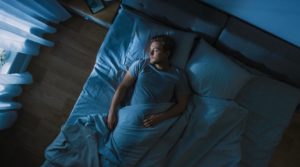
Get fitter in your sleep
When you follow a well planned training program over a period of time, your body gets fitter. Most people would acknowledge that. Exercise=fitness. Full stop. Right? Not necessarily.
One of the really important components of fitness, and one that gets overlooked way too often, is recovery. And one of the really important components of recovery is sleep. I’ve written before on how chronic sleep deprivation can inhibit weight loss, and in fact cause us to gain weight, but today I wanted to look at how sleeping helps you to get fitter.
But firstly, we need to look at how training gets you fitter.
A guy named Hans Selye described how the body responds to the stress of exercise, using what he termed the General Adaptation Syndrome (GAS). Basically, the body goes through a set of specific short term responses, and longer term adaptations, after being exposed to a stressor. The body goes through three stages in response to a stressor. Exercise is one such stressor.
Stage 1: Alarm or shock. This is the immediate response to the stress of exercise, and can include feeling flat, sore or stiff and a bit tired. The fitter you are, the greater the stress needed to induce this shock phase. Hence, it’s really important to have a training program that takes into account your individual fitness level.
Stage 2: Adaptation or resistance. The body responds to repeated bouts of training. It thinks, “Crikey, if she’s going to keep doing this to me, I’d better do something about getting stronger”. The body equips itself with the tools to survive further stress of the type you are imposing on it. This can include nervous system adaptations, hormonal changes, and tissue building, just to name a few. You need to have stressed your body sufficiently in stage 1, for adaptations to take place in stage 2.
Stage 3: Exhaustion. This is the stage you never want to reach. It’s simply put, over training. Too much training and not enough recovery. There’s just too much stress for the body to be able to adapt.

The Role of Sleep In Recovery
For anyone at least partially serious about their fitness, harder training is a double edged sword. It can be the key to greater fitness, but can also send your body over the top towards injury and illness. Exercise can cause heaps of stress to joints and ligaments, muscles, the nervous system, and the endocrine (or hormonal) system. And yet, it’s the stimulus your body needs to signal it to get stronger to make itself better able to cope with that stress of exercise.
Recovery takes place anytime you ease off with your workload. You can still actually be exercising whilst you are recovering (most training programs will include a recovery every 3-5 weeks where you ease back on your training-and if yours doesn’t, it should), but it’s when you’re at rest that the greatest training adaptations take place. Sleep is the ultimate rest period in which your body can adapt to all your hard training.
During sleep, hormones such as the rejuvenating Human Growth Homone (HGH) reach their peak. Your immune system gets a recovery boost when you’re asleep, and neurotransmitters in the brain are replenished. There’s an amazing amount of biochemical activity going on inside your body when you are asleep.
Human growth hormone is important for well, yes, growth. It’s also linked with fat loss, muscle tone, immune health and the firmness and elasticity of your skin. Mostly, when HGH receives a natural boost, it’s a good thing, and sleep causes HGH secretion to peak. So, if you’re not getting enough sleep, you’re not getting the maximum levels of HGH your body can produce, and directly adversely effecting your performance.

The other really critical thing sleep promotes is the replenishment of neurotransmitters. Neurotransmitters are chemicals which transmit signals from a neuron to a target cell in the body. They regulate quite a few physical and emotional processes, including mental performance, emotional states, and the pain response. All of these are important for physical fitness. If your neurotransmitters aren’t working effectively, you won’t get much done in any part of your life, let alone your recreational exercise.
With your neurotransmitters under functioning, you’re likely not to be in a great emotional state to train. Day after day you’ll be having “one of those days” where you just don’t feel like you can do much of anything. You wake up just knowing that exercise isn’t going to happen today, unless you have someone drag you kicking and screaming to your workout.
Of course, it’s very easy for me to say get more sleep. If insomnia isn’t an issue, often it’s just a case of not being in bed for long enough that prevents us from getting enough sleep. Turn off the TV, shut down social media channels, and get to bed. And make sure all your electronic devices are on the other side of the door!
If you’re keen to give your training a boost, find out how online coaching can help.


